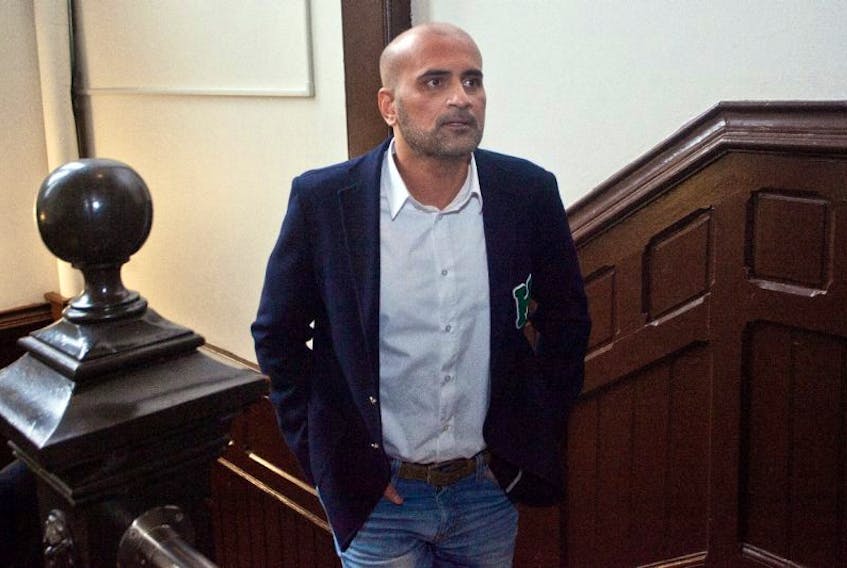The Nova Scotia Court of Appeal has overturned a Halifax taxi driver’s acquittal on a charge of sexual assault.
Bassam Al-Rawi was found not guilty in Halifax provincial court last March of sexually assaulting an intoxicated woman who was discovered by police passed out and partially naked in the back seat of his vehicle in May 2015.
Judge Gregory Lenehan, in his decision acquitting Al-Rawi, said the Crown did not prove that the woman had not consented to sexual activity with the driver.
Although the woman had no memory of being in the taxi. Lenehan said: “Clearly, a drunk can consent.”
The acquittal was met by a public outcry. The Crown appealed the decision, saying the judge had made at least a halfdozen mistakes in law.
A three-member Appeal Court panel heard the appeal in November and released its decision Wednesday saying Lenehan had erred in law.
“The trial judge erred . . . in finding that there was no evidence of lack of consent,” Justice Duncan Beveridge wrote.
“The trial judge ignored or disregarded a substantial body of circumstantial evidence that would permit an inference to be drawn that either the complainant did not voluntarily agree to engage in sexual activity with the respondent or lacked the capacity to do so.”
The decision, in summarizing the evidence, says the young woman was found by police unconscious in the rear seat of the taxi on a south-end Halifax street. She was naked from the waist down and her legs were propped up on the front seats.
Al-Rawi was seen by police trying to hide the complainant’s urine-soaked pants and underwear between the console and the front seat. The driver’s zipper was partway down, as was the back of his pants.
The taxi was far from any route to the complainant’s home and she had no memory of getting into the car, nor anything that happened in the cab. The complainant, who did not know Al-Rawi, also did not know why the taxi would be parked where it was.
Prosecutor Jennifer MacLellan said the Crown’s latitude in appealing a verdict is quite limited.
“When the Crown decides to appeal a case, there is only one basis on which we can appeal,” MacLellan said. “That’s an error of law.
“We felt that we had a strong argument going in and I was glad that the Nova Scotia Court of Appeal agreed with us on that.”
Justice Jamie Saunders concurred in the Appeal Court decision while emphasizing the trial judge’s statement that a drunk can consent was correct in law and not the reason for reversal in the case.
“The pivotal issue was whether, when and to what extent the complainant’s level of intoxication had affected her capacity to consent during the 11 minutes she spent in the taxi,” Saunders said.
“The judge erred in failing to conduct that inquiry and failing to address the body of circumstantial evidence that would have informed his analysis.”
MacLellan said the appeal hinged on the level of intoxication and the young woman’s capacity to consent.
“What we argued, and what the court accepted, was that having an operating mind and having the capacityto consent is more than just unconsciousness, which seemed to be what the trial judge found,” MacLellan said.
“We didn’t argue that (the drunks can consent comment) was the whole reason for going for an appeal, and we wouldn’t have been successful if we had. We argued that what the trial judge failed to do was make the determination of how drunk was too drunk.
“There are different levels of intoxication. At some point, you get too far, you get to the point where you no longer have an operating mind. That is one of thethings that the court addressed in this decision. They accepted our arguments that the trial judge had erred when he equated incapacity only with unconsciousness. They found that there is something short of that, in which you still don’t have an operating mind and you can’t consent to sex because you are just too intoxicated.”
MacLellan said she has been in contact with the young woman but a decision about whether to go to trial again has not been reached.
“Now at least we are in a position where we can take it to trial again, now that the courts ordered that and quashed the acquittal,” she said. “I spoke to the complainant today and we will be meeting with her in the coming weeks, and with the police, and making those determinations. She is a very brave and patient woman and she has certainly been through a lot. I think she appreciates the significance of all this. I’m sure she’d rather not be at the centre of it.”
Saunders said he hopes the outcry that greeted Lenehan’s decision “will not cause him or his judicial colleagues to be cowed in the way they decide the matters that come before them, and that they will continue to judge with the courage, independence and impartiality their oath and our law demand.”
MacLellan said the public backlash did not sway the Crown’s decision to appeal but she hopes that those who were concerned by the trial judge’s decision will take solace in the Appeal Court ruling.
“There are checks and balances in place that when a mistake is made at a lower level of court, it can be rectified,” MacLellan said.
“There was a lot of anxiety out there after this decision had been released. I’m hopeful that for some of these people that when they read it, they’ll see that this decision that we didn’t for whatever reason think was a just decision, has been rectified and the courts worked as they should.”









